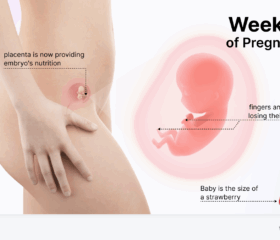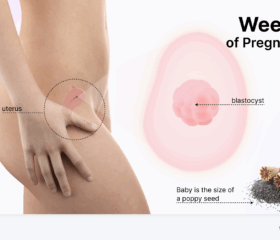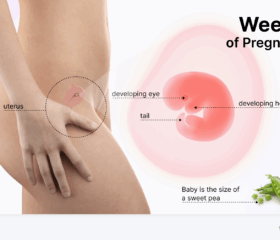Pregnancy Week by Week
5 Weeks Pregnant
Your baby is as big as an apple seed.
0.1
inches
- 5 Weeks Pregnant: Signs, Symptoms, and Important Steps to Take
- Recognizing the signs of pregnancy at 5 weeks
- Your baby’s development at 5 weeks
- What changes should you expect in your body after 5 weeks?
- Health and safety tips to follow at 5 weeks
- Scheduling your first prenatal visit
- Should you announce your pregnancy at 5 weeks?
- Final thoughts
5 Weeks Pregnant: Signs, Symptoms, and Important Steps to Take
Your hormones have changed enough that you can now confirm your pregnancy with a home testing kit. Congratulations!
Your baby is still tiny at this stage, but he’s developing quickly. Important things are happening, including the formation of his heart and other organs.
Now that you know you’re pregnant, it’s time to start taking prenatal vitamins, schedule your first prenatal visit, and pay extra attention to making healthy lifestyle choices to lay the foundation for a smooth pregnancy. Read on to learn more.
Recognizing the signs of pregnancy at 5 weeks
Again, week 5 is often when you’ll first notice the early signs of pregnancy. A missed period is often the first clue, followed by pregnancy symptoms like: 1
- Morning sickness: Arguably the most infamous symptom of pregnancy, this means nausea and sometimes vomiting. Despite the name, it can occur at any time of day.
- Food and scent aversions: Certain foods or scents may suddenly seem unpleasant or overwhelming.
- Fatigue: You may feel unusually tired, even when you haven’t been doing much of anything.
- Sensitive or swollen breasts: Your body may increase the blood flow to your breasts, making them swollen and achy or unusually sensitive.
- Frequent urination: Similarly, your body’s blood volume will increase (in fact, if you pay close attention, you may notice yourself getting thirsty more often and drinking more). This will put pressure on your bladder and send you to the bathroom more often.
- Spotting or implantation bleeding: Some women—about 1 in 4—experience light bleeding in the early stages of pregnancy. This may happen after sex, but it can also sometimes happen just because.
Most of these symptoms are caused by a flood of hormones as your body gets ready to support your developing baby.
Many are caused by something called human chorionic gonadotropin (hCG), which is produced by the placenta, a small organ that temporarily forms in your uterus when you’re pregnant. This hormone, incidentally, is also what home pregnancy tests check for in your urine. 1
Other hormones, such as progesterone, estrogen, and GDF15, have also been linked to symptoms like nausea in pregnancy. 2
Do all women experience symptoms at 5 weeks?
Not all pregnant women experience symptoms at this stage at all. Some have no noticeable signs, while others may find that their symptoms come and go. Both are normal and not a cause for concern.
How to deal with your symptoms (and how to know if they need medical attention)
In most cases, the symptoms you’ll experience at 5 weeks will be mild and manageable, although they might be inconvenient. Most women don’t need to see a doctor at this stage, although it is time to book your first visit, which we’ll talk about below. 3
Get plenty of rest and avoid foods that make you queasy. You may also want to try eating frequent smaller meals throughout the day instead of a few larger ones, which can make it easier to deal with morning sickness. Most of the time, that will be enough.
Serious symptoms that require medical attention
Rarely, symptoms can be more severe, which may indicate a problem that you’ll have to see a doctor for. Be on the lookout for these issues:
- Excessive vomiting: Very strong morning sickness is known as hyperemesis gravidarum. If you’re unable to keep food or fluids down, it can lead to weight loss and dehydration. 4
- Heavy bleeding: Spotting is usually harmless, but very heavy bleeding (i.e., soaking a pad within a few hours) or severe cramping could be signs of a miscarriage or an ectopic pregnancy—the fertilized egg implanting outside the uterus. 5
Again, issues like this are rare, but if you experience either of these symptoms or anything else that worries you, get in touch with your doctor right away.
Your baby’s development at 5 weeks
At this stage, your baby is still an embryo. His size is measured from the top of his head to his rear (its crown-rump length, or CRL). By the fifth week, most embryos are 0.08–0.12 inches (2–3 mm) long, around the size of an apple seed.
Even though he’s still very small, your embryo already has a distinct head and tail, with a shape that’s often compared to a tadpole.
Internal development and structure
Inside the embryo, key structures are developing. A hollow structure called the neural tube, which will become the brain and spinal cord, is forming. Your baby’s heart is also growing, and may show faint cardiac activity by the end of the week.
The embryo is composed of three layers, each of which will form different body systems:
- Ectoderm: This outer layer will become your baby’s hair, brain, spinal cord, skin, and nails.
- Mesoderm: The middle layer will form your baby’s heart, muscles, bones, and much of its reproductive system.
- Endoderm: The innermost layer will develop into the lungs, intestines, thyroid, and liver.
Inside your uterus, a network of blood vessels, which will become the umbilical cord, is already connected to the developing placenta, which is busy delivering nutrients and oxygen to the embryo.

What changes should you expect in your body after 5 weeks?
At 5 weeks, you might or might not see changes in your own body as it adjusts to your new pregnancy. They may include:
Abdominal bloating
You won’t actually start “showing” at this stage of your pregnancy, but it’s possible you’ll notice early bloating that makes your clothes feel snug and makes you feel uncomfortably full.
Your baby is still very small, so if this happens, it’ll be entirely due to hormonal shifts causing you to retain more fluid, and not your uterus growing to accommodate the baby, although that will happen later.
Weight gain or loss
Throughout the first trimester (the first 12 weeks), most women will gain around 2 to 4 pounds. 6 This might already be starting, although that isn’t guaranteed.
In fact, it’s also possible you’ll have lost some weight. This is especially likely if you’re experiencing morning sickness or food aversion. As long as your weight loss is limited to a couple of pounds, it isn’t anything to worry about.
Health and safety tips to follow at 5 weeks
At 5 weeks, it’s time to start maintaining a healthy pregnancy diet and making a few simple changes to your habits to give you the best possible chance of having a healthy, complication-free pregnancy. 7 8 9
Diet
- Take prenatal vitamins: If you aren’t already, start taking a daily prenatal vitamin with 400 micrograms of folic acid. This will reduce the risk of spina bifida, a defect where your baby’s heart and other organs develop incorrectly. Note that you may experience some side effects from taking prenatal vitamins, like nausea. If they’re hard to keep down, talk to your doctor about switching to a different brand that’ll be easier on your stomach.
- Avoid alcohol and smoking: You can’t drink wine or other alcohol while you’re pregnant, and you’ll also need to avoid tobacco entirely. They can both harm your baby’s development. Seek help if you have trouble quitting.
- Limit caffeine: You can still drink coffee while you’re pregnant, but you’ll need to limit your caffeine intake to 200 mg per day or less—about one 12-ounce cup of coffee.
- Avoid risky foods: You’ll need to avoid certain foods when you’re pregnant, like unpasteurized dairy, raw or undercooked meat, sushi and other raw fish, and high-mercury fish like swordfish and tuna (though you can eat canned light tuna while pregnant). When you have the munchies, opt for healthy pregnancy snacks, like trail mix and fruit.
- Stay hydrated: Be sure to drink plenty of water throughout the day (although it’s okay to taper off before bed to limit your nighttime trips to the bathroom).
Hygiene and safety
- Steer clear of litter boxes: Handling cat feces increases your risk of getting toxoplasmosis during your pregnancy, an infection that could harm your baby. If you have a cat, ask someone else to pick up the litter box duties.
- Wear gloves if you garden: Soil can also contain harmful parasites and microbes, so if you’re a gardener, be diligent about covering up.
- Wash carefully when you cook: The same goes for food, especially raw meat and produce. When you prepare meals, wash your hands (with soap) before and afterward. Thoroughly wash any fruit or veggies you use, as well as your knives and cutting boards. 10
Beyond these small adjustments, make sure to take it easy. It’s fine to lightly exercise, but even in the early stages of pregnancy, your rest is important, so don’t go overboard, and get plenty of sleep.
Scheduling your first prenatal visit
As mentioned, you don’t need to see a doctor in your 5th week unless you have unusually severe symptoms, but it’s time to start planning for your prenatal care.
Choosing a healthcare provider
You’ll need to consult with either:
- An OB-GYN: As you probably already know, obstetrician-gynecologists (OB-GYNs) are medical doctors who are trained to manage all aspects of pregnancy.
- A midwife: Midwives, on the other hand, are not medical doctors, but they’re still trained to manage low-risk pregnancies (as well as to refer patients to OB-GYNs if there are any complications).
If you don’t have any reason to believe your pregnancy might be high-risk, such as serious early symptoms or a family history of complications, it’s up to you which type of professional you want to see. If you’re considering a midwife, check their credentials to ensure they’re certified and connected to a reputable hospital or birthing center.
When you select a provider, check with your insurance company for a list of in-network options.
When you evaluate each option, consider their experience level and communication style, as well as their availability (how open their schedule is and how far they are from you). You can also ask for recommendations from your friends or family.
If you opt for a midwife, make sure they can refer you to an obstetrician if necessary
Midwives can only perform normal vaginal deliveries. Obstetricians are required for all operative deliveries (e.g., C-sections and vacuum or forceps-assisted deliveries). If you see a midwife, make sure they have a known network of obstetricians they can refer you to in case the pregnancy becomes high-risk.
Your first prenatal visit
You should generally schedule your first pregnancy appointment for when you’re around 8 weeks pregnant. During the visit, your provider will estimate your due date and order routine tests, including bloodwork and a urine test, to check for conditions like anemia and infections. 3
They may also order an early ultrasound to confirm your baby’s development and detect their heartbeat.
Come prepared with your own questions, too. Make sure you ask about any recommended vaccines (like whether or not you can get the flu shot while pregnant) and any other concerns you have.
Preparing for your visit
Before your visit, gather your family’s medical history to share with your provider. Ask your relatives about chronic conditions like diabetes, high blood pressure, or thyroid issues, as well as any genetic disorders that run in the family.
Having this information will help your provider identify potential risks and figure out whether they need to order additional tests or take special precautions.
You should also prepare a list of questions to bring to your first appointment. You might want to ask about:
- How to manage your early symptoms
- Dietary recommendations
- Warning signs to watch out for
- Any specific concerns about your health history
Write these down in your journal or pregnancy tracker app and bring the list with you (some of the best pregnancy trackers offer prenatal appointment reminders, question checklists, and a pregnancy calendar to track and plan visits). Your first visit might be a little overwhelming, and you don’t want to forget to address anything important.
Should you announce your pregnancy at 5 weeks?
When to share the news about your pregnancy is a personal choice. Many people choose to announce right away, either to ensure they have a support system during the early weeks or just because they’re excited.
Others prefer to wait until after 12 weeks, when the risk of miscarriage decreases. Think about what feels right—this is entirely your choice, and there’s no one right answer.
Final thoughts
Week 5 is an exciting time, regardless of whether your pregnancy was a surprise or you’ve been testing for it regularly.
This period can also be unpredictable. Your symptoms might be intense, subtle, or absent entirely. All three possibilities are completely normal.
It’s worth repeating: focus on self-care during these early weeks. Rest when you’re tired, eat balanced meals, and reach out to your healthcare provider if you have concerns.
If you have friends or a partner who you can lean on, don’t be afraid to do that (after all, you might never have a better excuse to make them shoulder more of the housework!)
Taking proactive steps now will lay a strong foundation for the months ahead.
Article Sources
- Eunice Kennedy Shriver National Institute of Child Health and Human Development. "What are some common signs of pregnancy?" Retrieved June 23, 2025.
- Nature. "GDF15 linked to maternal risk of nausea and vomiting during pregnancy" Retrieved June 23, 2025.
- Eunice Kennedy Shriver National Institute of Child Health and Human Development. "What happens during prenatal visits?" Retrieved June 23, 2025.
- MedlinePlus. "Hyperemesis gravidarum" Retrieved June 23, 2025.
- National Institute for Health and Care Excellence (NICE). "Ectopic pregnancy and miscarriage: diagnosis and initial management" Retrieved June 23, 2025.
- MedlinePlus. "Managing your weight gain during pregnancy" Retrieved June 23, 2025.
- Office of Disease Prevention and Health Promotion. "Eat Healthy During Pregnancy: Quick Tips" Retrieved June 23, 2025.
- U.S. Centers for Disease Control and Prevention. "About Folic Acid" Retrieved June 23, 2025.
- MedlinePlus. "Pregnancy and Nutrition" Retrieved June 23, 2025.
- U.S. Centers for Disease Control and Prevention. "Toxoplasma (Food Safety for Moms-to-Be)" Retrieved June 23, 2025.







